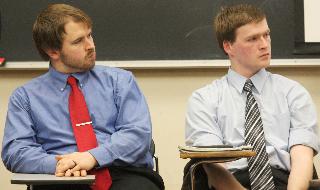EIU Democrats and Republicans speak on Egypt
The EIU Democrats and Republicans and three professors spoke at a forum to discuss the revolution and current political state in Egypt Thursday in Coleman Hall.
The forum began with a video of compiled coverage of the Egyptian Revolution. It began with shots of Jan. 25, known as “The Day of Rage” and ended with Feb. 11, or “Farwell Friday.”
Ahmed Abou-Zaid, a professor of economics and former citizen of Egypt for 35 years, said he has a more personal connection with the subject matter.
“I’m not speaking (just) as a professor, but as an insider,” he said.
Abou-Zaid said one of the causes of the revolution was the middle class diminishing, causing the people to revolt. He said surprisingly, the upper class helped bring about the revolt.
“It wasn’t started by the lower (class) people,” he said.
Abou-Zaid said fraud also caused the Egyptian people to become angry with the government.
“There was a long list of corruption and monopoly done to the Egyptians,” he said.
David Carwell, a professor of political science, said the country’s unsatisfactory economic status and high unemployment rate contributed to the revolt.
Brett Anderson, an instructor of geography, agreed with Carwell, saying economics shaped the call for reform.
“Economics is at the heart of what happened in Egypt,” he said.
The professors cited technology as a key factor in bringing the protests together in Egypt. Abou-Zaid said posts on Facebook were especially instrumental in getting people involved with the cause and bringing down the government.
Carwell added that fast communication was also crucial.
“Could they have done this without cell phones?” he asked. “They were a key variable.”
Anderson said although Egypt is on their way towards democracy, it will be a long battle.
“We know what they didn’t want, but what do they want?” he said. “The creation of a whole new government will be an interesting thing to watch.”
Carwell added that organization of the new government will be necessary, but will also take time and consideration.
“It’s easy to say you’re going to have elections, but how are they going to do it?” he said. “The old rules don’t count anymore, but you don’t have any new ones yet.”
The forum members discussed the U.S.’ role in aiding Egypt. Jeremy Haas, a senior history major and young college Democrat, said if the U.S. helped Egypt out, we would inevitably benefit.
“We have to say we’re pro-democracy,” he said. “We want to respect the people doing it and don’t want to go back on our word.”
Don Stone, a senior history and pre-law major and president of the EIU Republicans, said by not providing foreign aid to Egypt, the U.S. could be viewed in a more negative light.
“It would bring about anti-American sentiment,” he said.
Although Ryan Plunkett, a sophomore political science major and president of the EIU Democrats, said he thinks the U.S. will help Egypt, he does not think it will be out of moral obligation.
“The U.S. will do what we feel will benefit us in the long run,” he said. “It’s not right, but it’s what we’ve been known to do.”
Stone said that he thinks Egypt’s people will eventually be able to establish peace. “People don’t want war,” Stone said. “Egypt wants peace. There are always radicals, so I hope Egypt keeps (those) views out and keeps it moderate.”
Sara Hall can be reached at 581-2812 or smhall3@eiu.edu.
EIU Democrats and Republicans speak on Egypt

Jeremy Haas and Ryan Plunkett, student representatives of the College Democrats, listen during the question and answer portion of Thursday’s forum on the ongoing Middle East revolution in the lecture auditorium of Coleman Hall. (Kimberly Foster





































































